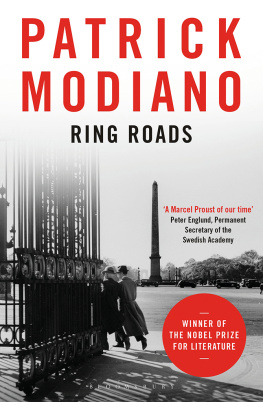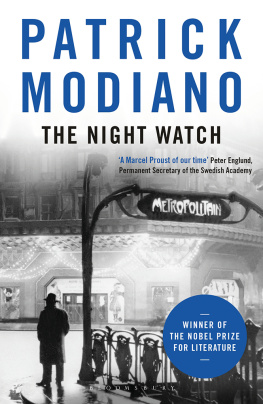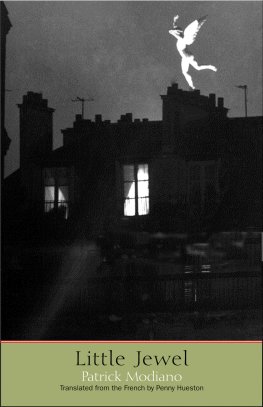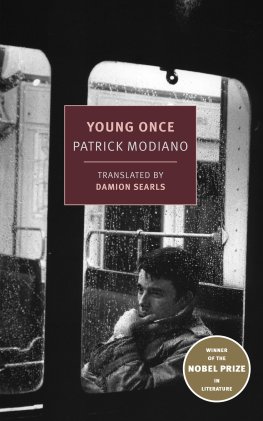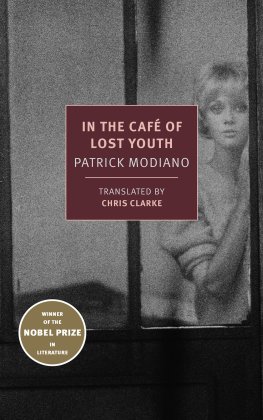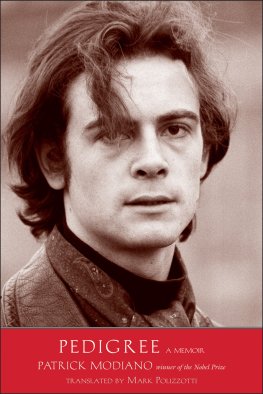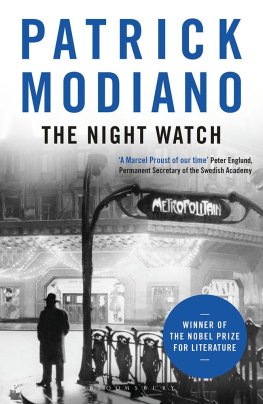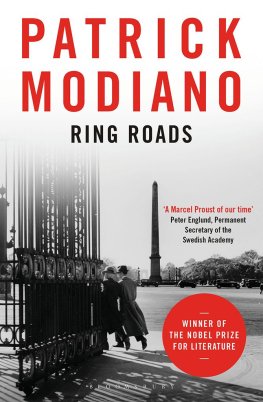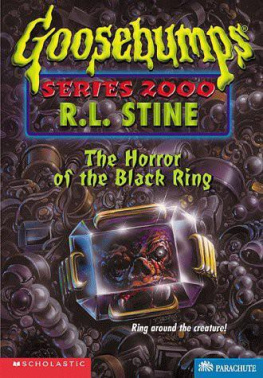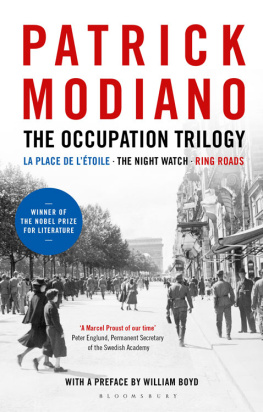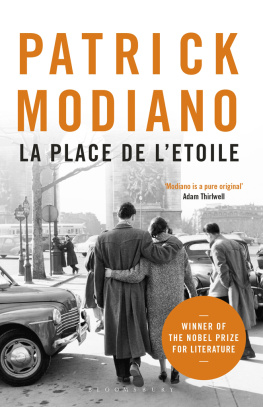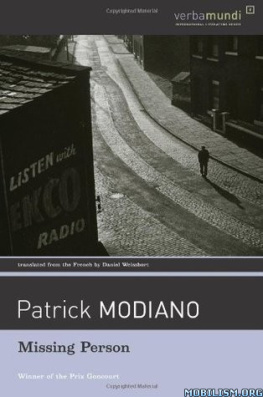A NOTE ON THE AUTHOR
PATRICK MODIANO was born in Paris in 1945 in the immediate aftermath of World War Two and the Nazi occupation of France, a dark period which continues to haunt him. After passing his baccalaurat, he left full-time education and dedicated himself to writing, encouraged by the French writer Raymond Queneau. From his very first book to his most recent, Modiano has pursued a quest for identity and some form of reconciliation with the past. His books have been published in forty languages and among the many prizes they have won are the Grand Prix du Roman de lAcadmie franaise (1972), the Prix Goncourt (1978) and the Austrian State Prize for European Literature (2012). In 2014 he was awarded the Nobel Prize for Literature.
BY THE SAME AUTHOR
La Place de ltoile
The Night Watch

First published in Great Britain by Victor Gollancz in 1974
This electronic edition published in 2015 by Bloomsbury Publishing Plc
Originally published in France 1972 by ditions Gallimard, Paris, as Les boulevards de ceinture
English translation by Caroline Hillier 1974, Victor Gollancz Ltd, 1974, revised by Frank Wynne in 2015
Reprinted by kind permission of the Orion Publishing Group
Les boulevards de ceinture ditions Gallimard, Paris, 1972
The moral right of the author has been asserted
No part of this book may be used or reproduced in any manner whatsoever without written permission from the publisher except in the case of brief quotations embedded in critical articles or reviews
Bloomsbury Publishing Plc
50 Bedford Square
London
WC1B 3DP
www.bloomsbury.com
Bloomsbury is a trademark of Bloomsbury Publishing Plc
Bloomsbury Publishing, London, New Delhi, New York and Sydney
A CIP catalogue record for this book is available from the British Library
eISBN 978-1-4088-6794-5
To find out more about our authors and books visit www.bloomsbury.com. Here you will find extracts, author interviews, details of forthcoming events and the option to sign up for our newsletters.
for Rudy
for Dominique
If only I had a past at some other point in
French history!
But no, nothing.
Rimbaud
Contents
T he heaviest of the three is my father, though he was so thin back then. Murraille is leaning towards him as if whispering something. Marcheret stands in the background with a half-smile, puffing out his chest a little, his hands gripping the lapels of his jacket. Its difficult to tell the colour of their clothes or their hair. It looks as though Marcheret is wearing a very loosely cut Prince-of-Wales check suit, and has fairish hair. Note the sharp expression on Murrailles face, and the worried one on my fathers. Murraille seems tall and thin, but the lower half of his face is pudgy. Everything about my father expresses total dejection. Except his eyes, almost starting out of his head.
Wood panelling, a brick fireplace: the Clos-Foucr bar. Murraille has a glass in his hand. As has my father. Notice the cigarette drooping from Murrailles lips. My father has his wedged between his ring and little fingers. A jaded affectation. At the back of the room, in semi-profile, a female figure: Maud Gallas, the manageress of Le Clos-Foucr. The armchairs in which Murraille and my father are sitting are probably leather. Theres a slight sheen on the back, just above the spot which Murrailles left hand is stubbing into. His arm curls around my fathers neck in a gesture which could be hugely protective. Flagrant on his wrist is an expensive watch with a square face. Marcheret, given his position and athletic build, is half hiding Maud Gallas and the shelves of aperitif bottles. On the wall, behind the bar, you can see without too much difficulty a tear-off calendar. The number 14, clearly visible. It isnt possible to make out the month or year. But, looking closely at the three men, and at the blurred outline of Maud Gallas, the casual observer would imagine the scene to be taking place in the distant past.
An old photograph, found by chance at the bottom of a drawer, from which you carefully wipe the dust. Night is drawing in. The ghosts file in as usual to the Clos-Foucr. Marcheret has perched on a stool. The other two have chosen armchairs by the fireplace. They ordered sickly and pointlessly elaborate cocktails which Maud Gallas mixed, with the help of Marcheret, who plied her with doubtful jokes, calling her my great big Maud or my Tonkinese. She didnt appear to take offence and when Marcheret slipped a hand into her blouse to paw a breast a gesture which always causes him to make a sort of whinnying noise she remained impassive, one cannot help wonder whether her smile reflects contempt or complicity. Shes a woman of about forty, blonde and heavily built, with a deep voice. The brightness of her eyes are they midnight blue or violet? is surprising in such a coarse face. What did Maud Gallas do before taking over this auberge? The same sort of thing probably, but in Paris. She and Marcheret often refer to the Beaulieu, a nightclub in the Quartier des Ternes, that closed twenty years ago. They speak of it in hushed tones. Hostess? Ex-cabaret artiste? Marcheret has obviously known her a long time. She calls him Guy. While they are mixing the drinks and shaking with suppressed laughter, Grve, the matre dhtel, comes in and asks Marcheret: What would Monsieur le Comte like to eat later? To which Marcheret invariably replies: Monsieur le Comte will eat shit, jutting his chin, crinkling his eyes and contorting his face in an expression of bored self-satisfaction. At such moments, my father always gives a little laugh to show Marcheret that hes enjoyed this witty banter exchange and thinks Marcherets the funniest man hes ever met. The latter, delighted at the effect hes having on my father, asks him: Isnt that right, Chalva? And my father, hurriedly: Oh yes, Guy! Murraille remains aloof from this repartee. One evening when Marcheret, in better form than usual, hiked up Maud Gallass skirt and said: Ah, a bit of thigh! Murraille put on a shrill society voice: You must excuse him, my dear, he thinks hes still in the Legion. (This remark casts a new light on Marcheret.) Murraille himself affects the manners of a gentleman. He expresses himself in carefully chosen phrases and modulates his voice to make it as smooth as possible, adopting a kind of parliamentary eloquence. His words are accompanied by sweeping gestures, never failing to add some flourish of chin or eyebrow, and tends to flick his fingers as though opening a fan. He dresses elegantly: English tweeds, shirts and ties in subtle matching shades. So why the strong smell of Chypre which hangs around him? And the platinum signet-ring? Look at him again: his forehead is broad, his pale eyes express a joyful frankness. But, below that, the drooping cigarette emphasises the slackness of his lips. The craggy architecture of his face disintegrates at jaw level. His chin slides away. Listen to him: sometimes his voice grows harsh and cracks. In fact, one has a nasty suspicion that hes cut from exactly the same coarse cloth as Marcheret.
This impression is confirmed if you watch the two men after dinner. Theyre sitting side by side, facing my father only the back of his head is visible. Marcheret is talking very loudly in a whip-like voice. Blood rushes to his face. Murraille has also raised his voice and his shrill cackling drowns Marcherets more guttural laugh. They wink conspiratorially and slap each other on the back. A sort of complicity is established between them, one you cant quite pin down. You would have to be at their table, listen to every word. From a distance you can only hear confused and meaningless snatches of conversation. Now theyre whispering together and their words are lost in the great empty dining-room. From the bronze ceiling fixture, a harsh light spills down on the tables, the panelling, the Normandy dresser, on the stag and roebuck heads on the wall. It weighs on them like cotton wool, muffling the sound of their voices. Not a single patch of shadow. Except my fathers back. Strange how the light spares him. But the nape of his neck is clearly visible in the glare of the ceiling-light, you can even see a small pink scar in the middle. His neck is bent forward as though offered to an invisible executioner. Hes drinking in their every word. He moves his head to within an inch of theirs. His forehead almost glued to those of Murraille and Marcheret. Whenever my fathers face looms too close to his own, Marcheret pinches his cheek between his finger and thumb and twists it slowly. My father jerks back but Marcheret doesnt let go. He holds him like that for several minutes and the pressure of his fingers increases. He knows my father must be in considerable pain. When its over, theres a red mark on his cheek. He strokes it furtively. Marcheret says: Thatll teach you to be nosy, Chalva... And my father: Oh yes, Guy... Thats true, Guy... He smiles.

